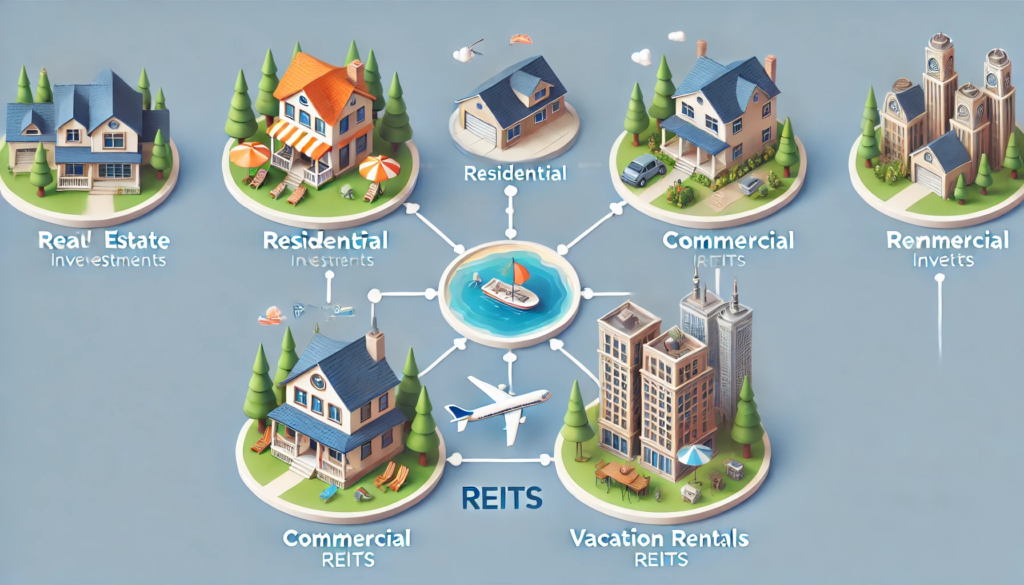The Pros and Cons of Real Estate Investing
Real estate investing is a popular way to build wealth, but like any investment, it comes with its own set of advantages and disadvantages. Understanding these can help you make informed decisions and determine if real estate is the right investment for you.
Table of Contents
Introduction
Imagine real estate investing as planting a tree. You plant the seed (your initial investment), and over time, with the right care and conditions, it grows into a sturdy, fruitful tree. However, this growth doesn’t come without challenges. There might be storms, pests, or droughts that test your patience and commitment. Similarly, real estate investing can yield significant rewards, but it also presents unique challenges that you need to navigate.
Understanding Real Estate Investing
Real estate investing involves purchasing, owning, managing, renting, or selling real estate for profit. It can be a lucrative venture, providing both passive income and potential long-term appreciation. However, it’s important to understand the different facets of real estate investing before diving in.
Pros of Real Estate Investing

1. Steady Income
One of the primary benefits of real estate investing is the potential for steady income. Rental properties can provide a consistent stream of monthly income, which can be especially beneficial for those seeking passive income.
2. Long-Term Financial Security
Real estate can be a long-term investment that provides financial security. Over time, property values tend to appreciate, building equity and increasing your net worth.
3. Tax Advantages
Investors can take advantage of various tax benefits, including deductions for mortgage interest, property taxes, operating expenses, depreciation, and repairs.
4. Hedge Against Inflation
Real estate often serves as a hedge against inflation. As the cost of living rises, so do property values and rental income, which can help maintain your purchasing power.
5. Control Over Investment
Unlike stocks or bonds, real estate allows you to have greater control over your investment. You can make improvements to increase property value, choose your tenants, and set rental rates.
Cons of Real Estate Investing

1. High Entry Costs
Real estate investing requires significant upfront capital for down payments, closing costs, and initial repairs or renovations. This high entry cost can be a barrier for many potential investors.
2. Time-Consuming
Managing rental properties or flipping houses can be time-consuming. Finding tenants, handling maintenance issues, and dealing with property management tasks can take considerable effort.
3. Market Volatility
The real estate market can be unpredictable. Economic downturns, changes in interest rates, and regional market shifts can affect property values and rental income.
4. Liquidity Issues
Real estate is not a liquid asset. It can take time to sell a property, and during that time, you may still need to cover mortgage payments, taxes, and other expenses.
5. Potential for Losses
While real estate can be profitable, it also comes with the risk of financial loss. Property values can decrease, tenants can default on rent, and unexpected repairs can be costly.
Types of Real Estate Investments

1. Residential Properties
These include single-family homes, multi-family homes, condos, and townhouses. Residential properties are often used as rental properties or for flipping.
2. Commercial Properties
These include office buildings, retail spaces, warehouses, and industrial properties. Commercial real estate can provide higher rental income but often requires more substantial investment and management.
3. Vacation Rentals
Properties in popular tourist destinations can be rented out on a short-term basis. While this can provide high rental income, it also requires more active management.
4. Real Estate Investment Trusts (REITs)
REITs allow you to invest in real estate without owning physical properties. They are companies that own, operate, or finance income-producing real estate and provide dividends to investors.
Financial Benefits

1. Cash Flow
Investing in rental properties can generate positive cash flow, providing a steady income stream after expenses are covered.
2. Appreciation
Over time, properties generally increase in value, offering the potential for capital gains when you sell.
3. Leverage
Using borrowed money to finance the purchase of a property allows you to leverage your investment, potentially increasing your returns.
Potential Risks
1. Property Damage
Tenants may cause damage to the property, leading to costly repairs. Regular maintenance and property inspections can help mitigate this risk.
2. Vacancy
Periods without tenants can result in lost rental income. Effective marketing and competitive pricing can help minimize vacancy rates.
3. Economic Downturns
Recessions or economic slowdowns can impact property values and rental income. Diversifying your investment portfolio can help manage this risk.
Market Volatility

1. Economic Factors
Interest rates, inflation, and unemployment rates can all influence the real estate market. Staying informed about economic trends can help you make better investment decisions.
2. Regional Differences
Real estate markets vary significantly by location. Understanding the local market conditions is crucial for successful investing.
Time and Effort

1. Active Management
Managing rental properties requires time and effort. Hiring a property management company can help, but it will reduce your overall return on investment.
2. Maintenance and Repairs
Ongoing maintenance and unexpected repairs can be time-consuming and expensive. Setting aside a budget for these expenses is essential.
Property Management

1. Finding Tenants
Finding reliable tenants is crucial for maintaining steady rental income. Background checks and thorough screening processes can help ensure you choose good tenants.
2. Handling Issues
Dealing with tenant complaints, late payments, and legal issues can be challenging. Having clear policies and procedures in place can help manage these situations effectively.
Liquidity Issues
1. Selling Challenges
Selling a property can take time, especially in a slow market. Being prepared for potential delays and having a contingency plan can help manage liquidity issues.
2. Ongoing Costs
While waiting to sell, you still need to cover ongoing costs such as mortgage payments, property taxes, and maintenance.
Tax Implications
1. Deductions
Real estate investors can take advantage of various tax deductions, including mortgage interest, property taxes, and depreciation.
2. Capital Gains Tax
Profits from selling a property are subject to capital gains tax. Understanding the tax implications can help you plan your investments more effectively.
Long-Term Appreciation
1. Historical Trends
Historically, real estate has shown a tendency to appreciate over the long term. This makes it an attractive investment for those looking to build wealth.
2. Forced Appreciation
Investors can increase a property’s value through renovations and improvements, leading to higher rental income and a higher sale price.
Diversification Benefits
1. Reducing Risk
Adding real estate to your investment portfolio can help diversify your assets and reduce overall risk.
2. Balancing Volatility
Real estate often behaves differently from stocks and bonds, providing a balance to more volatile investments.
Conclusion
Real estate investing offers numerous benefits, including steady income, long-term appreciation, and tax advantages. However, it also comes with challenges such as high entry costs, market volatility, and liquidity issues. By understanding the pros and cons, you can make informed decisions and determine if real estate investing aligns with your financial goals and risk tolerance.
FAQs
Q. What are the main benefits of real estate investing?
Real estate investing offers steady income, long-term financial security, tax advantages, and a hedge against inflation.
Q. What are the risks associated with real estate investing?
Risks include high entry costs, market volatility, time-consuming management, liquidity issues, and potential financial losses.
Q. How can I start investing in real estate?
You can start by researching different types of real estate investments, assessing your financial situation, and consulting with real estate professionals.
Q. What is a Real Estate Investment Trust (REIT)?
A REIT is a company that owns, operates, or finances income-producing real estate. It allows investors to invest in real estate without owning physical properties.
Q. How does real estate diversify my investment portfolio?
Real estate provides diversification by adding an asset class that behaves differently from stocks and bonds, reducing overall portfolio risk.

